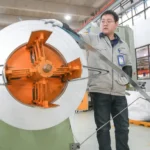Table of Contents
Published: March 30, 2025 | By WorldAffair.org
In 2025, Artificial Intelligence (AI) is no longer just a futuristic concept—it’s actively reshaping industries and driving global efforts towards sustainable development. As the world grapples with the effects of climate change, AI technologies are being applied to enhance energy efficiency, resource management, and the overall sustainability of industries. From improving renewable energy production to optimizing waste management systems, AI has emerged as a powerful tool in the fight against environmental degradation.
In this blog post, we explore how AI is being used for climate action, its role in enhancing sustainability across sectors, and the implications for global environmental policy in 2025.

🌱 AI and Climate Change: A Game Changer for Environmental Policy
The global response to climate change is at a critical juncture, and AI is playing a pivotal role in supporting sustainable development efforts. By 2025, the integration of AI into climate action strategies has become essential for accelerating efforts to reduce greenhouse gas emissions and mitigate the adverse effects of global warming.
AI in Climate Modeling and Predictions
AI-powered climate models are revolutionizing how we predict the effects of climate change and make informed decisions about mitigation strategies. These advanced systems can process massive amounts of data from satellites, sensors, and historical climate data to predict long-term environmental trends with a high degree of accuracy.
- Predictive Analytics: AI systems analyze patterns in weather, ocean currents, and greenhouse gas emissions to create highly accurate climate models. These predictions are crucial for governments and organizations to plan for future challenges, such as extreme weather events and sea-level rise.
- Real-Time Monitoring: AI tools are also being used to monitor real-time changes in the environment, providing up-to-date information about pollution levels, deforestation, and natural resource depletion. This allows for swift action and targeted interventions.
AI in Carbon Footprint Reduction
AI is also driving carbon footprint reduction strategies in various industries. From transportation to manufacturing, AI is optimizing systems to ensure more energy-efficient operations and lower emissions.
- Smart Grids and Energy Systems: AI is being integrated into smart grids to optimize energy distribution and use. By predicting peak demand times, AI systems ensure that electricity is used efficiently, reducing the need for excess energy generation and lowering emissions.
- Sustainable Manufacturing: AI-powered systems are improving production lines by minimizing waste, improving resource usage, and optimizing energy consumption, significantly reducing the carbon footprint of industries like automotive and electronics.

💡 AI for Renewable Energy: Powering the Future of Sustainability
AI has been a driving force in the renewable energy sector, helping to optimize the production, storage, and distribution of solar, wind, and hydropower energy. As the world strives to transition to cleaner sources of energy, AI is enabling more efficient systems to maximize energy generation while reducing waste.
Optimizing Renewable Energy Production
- Smart Solar Systems: AI is being used to optimize the performance of solar panels by predicting weather patterns and adjusting energy production in real-time. This helps solar farms to capture the maximum amount of sunlight and increase overall energy output.
- Wind Energy Forecasting: AI is enhancing the efficiency of wind turbines by predicting wind speeds and directions, allowing turbines to adjust their positioning for optimal energy capture. This ensures higher efficiency and more consistent energy generation.
- Energy Storage: AI algorithms are improving energy storage systems, ensuring that surplus renewable energy is stored efficiently during periods of high production. This energy can then be used when demand is high or when renewable generation is low.
By 2025, AI-driven renewable energy systems are expected to account for a significant portion of the global energy grid, helping to decarbonize electricity generation and reduce reliance on fossil fuels.

♻️ AI in Resource Management and Waste Reduction
Sustainability isn’t just about reducing carbon emissions; it also involves managing natural resources more efficiently. AI is playing a critical role in resource management by optimizing the way we use water, land, and materials.
AI for Water Conservation and Management
- Smart Irrigation Systems: AI-powered irrigation systems are transforming agriculture by ensuring that water is used efficiently. These systems analyze soil moisture levels and weather patterns to deliver the right amount of water to crops, reducing waste and conserving valuable water resources.
- Water Quality Monitoring: AI systems are also being used to monitor water quality, detecting contaminants and pollutants in real-time. This helps governments and organizations take swift action to protect freshwater resources.
AI in Circular Economy and Waste Management
The circular economy model, which focuses on reusing and recycling materials, is gaining traction as a sustainable solution. AI plays a key role in optimizing waste management processes, ensuring that resources are reused effectively and waste is minimized.
- Smart Recycling: AI-powered systems can identify and sort materials more efficiently than humans, increasing recycling rates and reducing waste. These systems can process large volumes of waste, ensuring that valuable materials like metals and plastics are recycled and repurposed.
- Waste-to-Energy: AI is improving waste-to-energy technologies, which convert non-recyclable waste into energy. By optimizing combustion processes and waste sorting, AI increases the efficiency of energy recovery and reduces landfill waste.
By utilizing AI for resource management and waste reduction, we can create a more sustainable, circular economy that reduces the strain on natural resources and minimizes environmental impact.

🌎 The Role of AI in Global Governance and Policy Making
As AI becomes increasingly important in sustainable development, there is a growing need for effective global governance frameworks to ensure that AI is used ethically and responsibly in addressing environmental challenges.
International Collaboration for AI in Sustainability
- Global Standards: Countries and organizations must collaborate to set international standards for the responsible use of AI in sustainability. This includes ensuring that AI systems are transparent, fair, and unbiased, particularly when they are used in decision-making processes related to resource management and climate action.
- AI Ethics and Regulation: As AI becomes integral to environmental policy, governments must establish clear regulations to address issues such as data privacy, accountability, and the potential misuse of AI in areas like surveillance and resource allocation.
By 2025, global cooperation on AI ethics and regulation will be crucial for ensuring that AI technologies are used in ways that align with sustainable development goals (SDGs) and respect human rights.

🔮 The Future: AI’s Potential for a Sustainable Planet
As we move towards 2030, AI will continue to play an increasingly vital role in sustainability efforts worldwide. By 2025, the AI-powered solutions we see today will have expanded in scope, efficiency, and integration, driving global progress on the UN Sustainable Development Goals (SDGs).
AI’s ability to address climate change, optimize energy consumption, and manage natural resources offers a hopeful path forward. However, its success will depend on international collaboration, ethical AI development, and continued investment in green technologies.
By leveraging AI in a responsible and sustainable manner, we can create a world where technology and nature work hand-in-hand for a healthier, more sustainable future.

✍️ Conclusion
AI is becoming a transformative force in global sustainable development. From climate change mitigation and renewable energy production to resource management and waste reduction, AI is playing a crucial role in shaping a more sustainable future. By 2025, AI will be deeply embedded in sustainability strategies across industries, enabling countries and businesses to tackle environmental challenges more effectively than ever before.
As we move forward, the challenge will be to harness AI’s potential while ensuring its ethical use, creating a future where technology accelerates the achievement of sustainable development goals for climate action and beyond.
Author Profile
- Syed Tahir Abbas is a Master's student at Southwest University, Chongqing, specializing in international relations and sustainable development. His research focuses on U.S.-China diplomacy, global geopolitics, and the role of education in shaping international policies. Syed has contributed to academic discussions on political dynamics, economic growth, and sustainable energy, aiming to offer fresh insights into global affairs.
Latest entries
 U.S. Foreign PolicyFebruary 2, 2026AI and Grand Strategy: The Case for Restraint – Navigating the Future of American Power
U.S. Foreign PolicyFebruary 2, 2026AI and Grand Strategy: The Case for Restraint – Navigating the Future of American Power National SecurityJanuary 31, 2026Treating China’s Connected Energy Systems as a National Security Risk
National SecurityJanuary 31, 2026Treating China’s Connected Energy Systems as a National Security Risk Global HealthJanuary 29, 2026The Future of the WHO—and How the United States Can Shape It
Global HealthJanuary 29, 2026The Future of the WHO—and How the United States Can Shape It Global TradeJanuary 22, 2026Trump Cancels Tariffs on European Nations Over Greenland Pursuit?
Global TradeJanuary 22, 2026Trump Cancels Tariffs on European Nations Over Greenland Pursuit?

